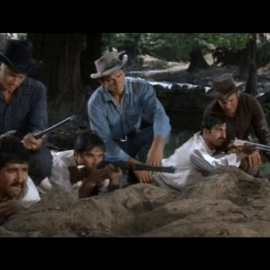From a piece by John C. Wright, from a few years ago: In none of the stories I just mentioned, even stories where the image of Our Lord in His suffering nailed to a cross is what drives back vampires, is any mentioned made of the Christ. Is is always an Old Testament sort of God ruling Heaven, or no one at all is in charge. So why in Heaven’s name is Heaven always so bland, unappealing, or evil in these spooky stories? I can see the logic of the artistic decisions behind these choices, honestly, I can. If I were writing these series, I would have (had only I been gifted enough to do it) done the same and for the same reason. It is the same question that George Orwell criticized in his review of THAT HIDEOUS STRENGTH by CS Lewis. In the Manchester Evening News, 16 August 1945, Orwell writes that the evil scientists in the NICE [the National Institute of Coordinated Experiments, who are the Black Hats of the yarn] are actually evil magicians of a modern, materialist bent, in communion with ‘evil spirits.’ Orwell comments: Mr. Lewis appears to believe in the existence of such
“This Story is Dated.”
I recently had the opportunity to finally pick up and read a classic of science fiction, E.E. “Doc” Smith’s Triplanetary. I’d had the paperback sitting on my shelf for quite some time, but had only in the last couple of months gotten around to reading it. I was a little confused at first, since none of the stuff about the Arisians or the Eddorians that was on the back cover was in the book. It turns out that Cosmos Books had only printed the original 1934 serial version of Triplanetary, from before Smith rewrote it to fit in with the Lensman series in 1947. Instead of the actual Lensman version of Triplanetary, that the cover advertised, these folks printed the original, and packaged it along with another story, “Masters of Space,” that Smith had serialized with E. Everett Evans in 1961 and 1962. Not knowing anything about the story, and being unsure if it was supposed to be part of the Lensman series or not, I went looking around the internet to find out about it.
Book Review: Somewhither
How does one describe John C Wright’s Somewhither? That is, indeed the question. While this book won the Dragon Award for Best Science Fiction novel this year, Science Fiction doesn’t quite cover it. In some ways, it’s about as Science Fictional as Star Wars. But since it deals with multiple parallel universes, with technological interfacing between them, I suppose the label “Science Fiction” works. It could just as well have been called “Philosophical/Metaphysical Action Adventure,” though even that wouldn’t quite cover it.
“Do-Something-ism” and Societal Childishness

“Jack,” Trent said, “When I was fourteen I was a man. Had to be. Well, it looks like your father dying has made you a man, too. “I’m giving you this Sharps. She’s an old gun, but she shoots straight. I’m not giving this gun to a boy, but to a man, and a man doesn’t ever use a gun unless he has to. He never wastes lead shooting carelessly. He shoots only when he has to, and when he can see what it is he’s shootin’ at. “This gun is a present with no strings attached except that any man who takes up a gun accepts responsibility for what he does with it. Use it to hunt game, for target practice, or in defense of your home or those you love. “Keep it loaded always. A gun’s no good to a man when it’s empty, and if it is settin’ around, people aren’t liable to handle it carelessly. They’ll say, ‘That’s Jack Moffit’s gun, and it’s always loaded.’ It is the guns people think are unloaded that cause accidents.” Louis L’Amour, The Mountain Valley War This isn’t just about guns or the current uproar over the reaction to the